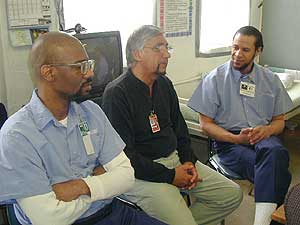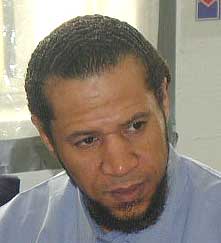Ohio Prison Finds Dramatic Success in Faith Based Program

Hakeem Johnson (L), Imam Haider Alawan and Ibraheem Thompson (R) sit discussing the Horizons Interfaith program in their dormitory at the Marion Correctional facility in Marion, Ohio. |
Warden Christine Money believes she may have found one way to keep some ex-convicts from returning to prison--faith in God. Under a new pilot program called Horizon Interfaith, a select group of prisoners at the Marion Correctional facility learn to live with prisoners of different faiths in separate living quarters as part of their rehabilitation. While working on strengthening their own faith, Jewish, Christian and Muslim prisoners also learn to live with each other.
"These men are coming together under the God of Abraham because his is the God of us all that unites us," said Imam Haider Alawan, a spiritual director at the Marion prison.
Alawan frequently drives an hour from his home in Cleveland to provide spiritual guidance and to lead prayer for the prison's Muslim population. He is one of several religious volunteers who frequently come to the medium security prison to encourage inmates to use faith as part of their rehabilitation.
The Imam believes this new program has been a great success. Horizons, now in its sixth year, has boasted a low number of participants returning to prison. Prison officials say recidivism for these prisoners is only four percent, well below the state and national averages.

Ibrahim Thompson, 42, says he's looking forward to life on the street as a Muslim. |
And that is good news in Ohio, a state that ranks sixth highest in the nation on per capita spending for prisons, according to a study by the Nelson A. Rockefeller Institute of Government.
And as America's prison population continues to grow at an alarming rate, men and women are also steadily being released from the prison system, having completed their sentences or been granted parole. It is estimated that nearly half a million prisoners will be released over the next several years, many of whom will typically have low-levels of education and few work skills making it difficult to find work. Yet despite these sobering facts, many in the Horizons program are hoping for a fresh start.
Inmate Ibraheem Thompson, 42, says he is looking forward to life on the street as a Muslim. Thompson, who found Islam during his 14-year incarceration, is expected to appear before the parole board this month. But the Cleveland native says he has some concerns about being accepted by other Muslims.
"We do want to be a part of the community. We don't want people to shy away from us because we're ex-felons," said Thompson.

Hakeem Johnson says he fears isolation once he is released from prison. |
He says he has a "penitentiary mentality" toward Islam and admitted that much of his understanding was on the rituals of prayer. He is hoping that by being with other Muslims, he will be able to apply Islam to real life challenges.
"We want to learn how to get along, and we want to learn how to live as Muslims," said Thompson.
Hakeem Johnson, a fellow Muslim inmate says he too fears isolation once he is released.
"[In prison], there's no way to reach out to the community...we need to understand ways Muslims on the street live," said Johnson who has spent the last five and half years in prison.
Thompson says he hopes to see more volunteers coming to the prison to provide more instruction on Islam, Arabic and other "tools to [take back]...to the hood".
"We want to be nurtured and babied in a lot of ways. We want to know that people are concerned about us," said Thompson.





